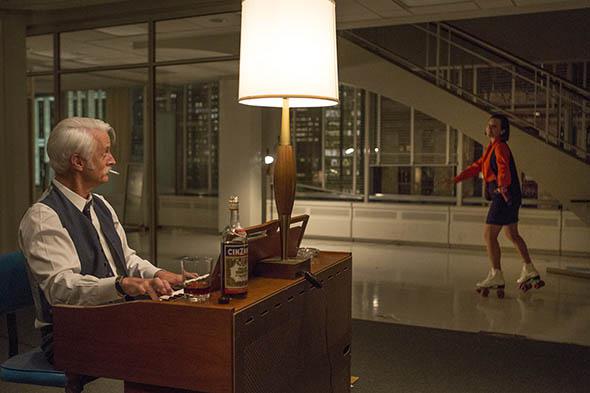John, Hanna—
Sorry guys, I just had to saunter down the hallway carrying obscene art a few times before I sat down to write about this episode. Peggy got two glory-GIF moments last night, the roller-skating and the cigarette strut, but both were undercut, for me, by the strong suspicion that she is walking into an ambush at McCann. Between the plant-bearing creatives gunning for her accounts and Jim Hobart’s steely dismissiveness, I think it’s unlikely that her McCann stint will help her achieve what her male mentors have achieved, and what she wants—a shop where her “name is on the damn door.” I suppose it’s possible that Peggy will find a happier outcome than Joan did. Peggy had a different style to start with, one that plays her womanliness down rather than up. (“You know I need to put men at ease,” she tells Roger when he first proffers the lascivious cephalopod.) Her post-skate aggression is badass, but again, not womanly. Maybe she’s the SC&P star who won’t get chewed up by the McCann machine. But I doubt it.
In part, that’s because this episode did a great job of conveying the ruthlessness of McCann. Jim Hobart was all conciliatory grandfatherliness when wooing Don, acquiring the company, and smoothing over the dissolution of SC&P. But this week he bares his teeth, keeping tabs on Don’s location, grilling his secretary, playing hardball with Joan, and pitting Don and Ted against each other and a dozen new colleagues. I also loved the narrow hallways, the gilded elevator, and the eerie wind whistling through Draper’s office windows—the organ scene wasn’t the only one that played like horror. (As you note, John, Mad Men’s ability to encompass any genre is a great and rare strength. I truly did think for a moment there that Peggy’s arc on Mad Men might end suddenly, with multiple stab wounds.) And when Don Draper stared at the Empire State Building and the tiny plane nearby and then headed for the hills—maybe I’m crazy, but I took that as a King Kong reference, with Don as the wild, passionate beast, about to be subdued at last by bureaucracy, civilization, empire. No wonder he broke free. Even in the wild country of Wisconsin, though, as you point out, John, Don can’t connect; the locals are much harder, more cunning, and more sophisticated than he expected.
There are two Roger scenes worth interrogating before we adjourn. The first was his encounter with Shirley, who quits despite his protestations. (“They can’t fire you!” he sputters. “Look, I hate Caroline too.”) But Shirley makes clear—or at least tells Roger—that her problems are not particular to SC&P. “Mr. Sterling, it’s not you. Advertising is not a comfortable place for everyone.” She’s going to work in insurance, where an advance scout (her cousin) reports more favorable conditions. The kind of personal relationships you point out, Hanna, the ones that helped Peggy and Joan advance at SC&P? There were no partners looking out for Shirley or Dawn in the same way. There has been an unstated, assumed cap on black advancement at SC&P for years, and so Shirley gets out while she is able. This was interesting on its merits, and by the end of the episode I was wondering whether there may be a similar cap on women’s advancement at McCann.
The second Roger scene worth examining is his inscrutable ship metaphor from his Navy days. He cowered at a steep drop but in the end made the leap, saying he “just needed a push.” The obvious metaphor here is that sometimes friends and colleagues give us the nudges we need to do big things. This seems like a cliché, but it actually runs counter to the show’s usual ethos: Mad Men has so often been about how your peers’ perceptions of you hem you in, trap you, pin you in a particular version of yourself. It’s the trap that Don is forever trying to escape. But there is also power in being truly known. The relationships built at SC&P all these years have merit. They’ve allowed for the unorthodox rise of two women (three, if you count Meredith, who has become remarkably capable and sturdy in the warm sunlight of Don’s need and trust). They’ve allowed for Roger to give Joan advice that is hard to hear but worth taking. And maybe, Roger’s pep talk will nudge Peggy toward success.
Would you get Marsha at Sugarberry Ham for me?
Julia
